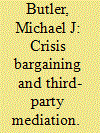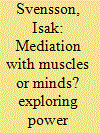|
|
|
Sort Order |
|
|
|
Items / Page
|
|
|
|
|
|
|
| Srl | Item |
| 1 |
ID:
079004


|
|
|
|
|
| Publication |
2007.
|
| Summary/Abstract |
The intersection of the study of bargaining and international crisis has proven a fertile area of inquiry that has notably excluded third-party mediation. This research chronicles this omission from the crisis bargaining literature, and seeks to identify whether mediation as a form of international crisis behavior merits inclusion in that literature. In conducting an empirical analysis of third-party mediation in international crisis, this study finds that mediation is in fact a prominent feature of international crisis, with the likelihood of mediation greatly increased in crises featuring a high overall level of violence as well as in crises of a military-security nature. On the basis of these empirical findings, this study concludes that third-party mediation is deserving of more systematic attention by scholars of crisis bargaining, offering suggestions for future inquiry to that end
|
|
|
|
|
|
|
|
|
|
|
|
|
|
|
|
| 2 |
ID:
079005


|
|
|
|
|
| Publication |
2007.
|
| Summary/Abstract |
This study investigates the informal mediations of 100 Israeli and 100 U.S. mediators. It was predicted that Israeli mediators - because of their collectivistic values and Dugri communication style - would be more assertive than their U.S. counterparts. Specifically, the Israelis were expected to put the disputants together more frequently, advise the disputants on how to act, and more often suggest concessions. We also compared the mediations of the Sepharadic Israelis (whose roots lie in Middle Eastern culture) to that of the Ashkenasim (of a European background). The former group was expected to be more assertive because of their collectivism. The data - based upon 200 personal interviews - support the hypothesis for international (Israeli-U.S.) differences but not for those between the Sepharadic and Ashkenasim.
|
|
|
|
|
|
|
|
|
|
|
|
|
|
|
|
| 3 |
ID:
079003


|
|
|
|
|
| Publication |
2007.
|
| Summary/Abstract |
Mediation research has for a long time been divided on whether 'power mediators' or 'pure mediators' are preferred as peace brokers in armed conflicts. This study contributes by drawing a broader empirical picture of international mediation in civil wars. It is argued that these approaches to international mediation are complementary rather than contradictory, and that combining power mediators with pure mediators should be the best way of enhancing the prospect of mediation success. Using data from the Uppsala Conflict Data Program on internal armed conflicts (1989-2003), the study examines and compares the effect of power mediators with pure mediators on different kinds of mediation outcomes: (1) the likelihood that parties reach agreements and (2) the provisions of those agreements. The study finds that although all types of mediators have a positive effect in terms of reaching agreements, power mediators outperform pure mediators. Most effective are the mediation attempts when both power and pure mediators are active as third parties. Examining the content of agreements, the study finds that pure mediators are more effective in reaching political and territorial power sharing provisions, whereas power mediators are more likely to be associated with military pacts
|
|
|
|
|
|
|
|
|
|
|
|
|
|
|
|
| 4 |
ID:
079001


|
|
|
|
|
| Publication |
2007.
|
| Summary/Abstract |
This article examines two instances of violent internal rebellion (Ivory Coast and the Philippines) that have escalated in intensity to the level of domestic insurgencies. Each insurgency operates on behalf of a population that has articulated claims of religious and ethnic discrimination by the state. In each case, the parties to the conflict have jointly approved international mediation of their disputes. In one instance, the mediating effort was repudiated by both parties, while in the other, the mediation process achieved significant progress in obtaining an agreement between the parties. The argument herein suggests that this disparity can be explained by examining the pace at which the different mediation teams implemented their effort
|
|
|
|
|
|
|
|
|
|
|
|
|
|
|
|
| 5 |
ID:
079006


|
|
|
|
|
| Publication |
2007.
|
| Summary/Abstract |
The release of Nelson Mandela from prison was remarkable mostly because of the nonevent it signified: the absence of a bloodbath that had been widely predicted for the country as the apartheid regime grew increasingly tense, cruel and unsustainable. Four years after the release and after a complex series of negotiations between Mandela and President De Klerk, South Africa staged its first one man-one vote election and again, peacefully, a new multiracial South Africa was born. How did this negotiation miracle happen? How were these two very different men, for decades implacable enemies, able to interrupt the cycle of violence and find a mutual solution to the increasingly dire situation in South Africa, one that met each of their interests and identity concerns and that was also built on common ground? Where along the way, in the long prison years before Mandela's release, was the decision reached on both sides to give peace a chance and to take the risk of negotiation? This article makes use of a negotiation game commonly used in negotiation and mediation skills training to analyze the personal dynamics of this particularly important historical negotiation. Drawing on material from unpublished interview sources and biographical and historical texts (as well as negotiation theory on the Prisoners' Dilemma), it seeks to shed new light on the question of what turned the tide and to explore transferable lessons learned from this experience for application to other difficult conflicts, not only in the political arena
|
|
|
|
|
|
|
|
|
|
|
|
|
|
|
|
| 6 |
ID:
079000


|
|
|
|
|
| Publication |
2007.
|
| Summary/Abstract |
The study of international mediation has long been dominated by single case studies or experimental approaches. This article argues for a more systematic approach and advocates a cross-national, longitudinal and empirical analysis of mediation based on actual historical data. The kind of information this approach can yield is invaluable in disentangling the structural aspects of mediation. This article presents the logic, rationale, and theory behind the most extensive data set on international mediation: the Correlates of Mediation Project. Data on all formal mediation events were collected for the period 1945- 1995. The structure of the data and some important findings are presented here. The advantages of data analysis are discussed and future challenges and developments are noted
|
|
|
|
|
|
|
|
|
|
|
|
|
|
|
|
| 7 |
ID:
079002


|
|
|
|
|
| Publication |
2007.
|
| Summary/Abstract |
When is the right time for a ceasefire to interrupt a civil war? Is it before or after negotiations on political reforms begin? Should mediators give priority to reaching a truce in order to save lives immediately while running the risk of prolonging the conflict? Or should they first promote the achievement of a political settlement that is likely to bring about a lasting peace and, with it, a definitive end to the carnage? The purpose of this article is to help negotiators make this uneasy decision. The question of the best timing for a ceasefire is addressed by assessing whether it ought to occur before, during, or after the negotiations over political issues underlying the conflict. The conclusion reached is that mediators eager to solve the conflict and limit the overall amount of damage are best advised to interrupt the fighting during the negotiation process, after the belligerents have attained a broad consensus on how to deal with the political issues at the root of the conflict.
|
|
|
|
|
|
|
|
|
|
|
|
|
|
|
|
|
|
|
|
|